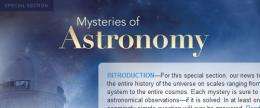June 1, 2012 report
Science journal offers up essays on 8 mysteries in astronomy

(Phys.org) -- Because astronomy and astrophysics are still so much a mixture of theory, conjecture and generally difficult to measure phenomenon, at least as compared with many of the other sciences, one of the most highly respected science journals, Science, has chosen to run a series of articles detailing eight of what it deems the most compelling questions currently vexing those who study the cosmos; each written by someone uniquely qualified to delve into the subject matter at hand.
Adrian Cho is up first with an essay describing the hotly debated topic of Dark Energy, the reason behind why everything in the universe is scattering away from everything else faster than it used to be, or really should be. Equally vexing is that models and equations suggest that whatever the mysterious energy is, it appears to make up 73% of everything that exists, and still it can’t be seen, or even measured.
Tied closely to dark energy is Dark Matter, the stuff that most in the field agrees is there, yet can’t really explain in any meaningful way. Adrian Cho authors this second in the series and highlights the fact that dark matter is merely a term for describing whatever it is that holds everything in the universe together. He argues that unlike dark energy, scientists stand a reasonably good chance of one day actually detecting a particle of the stuff, which would of course prove that it really does exist.
In the third essay, Yudhijit Bhattacharjee, asks, Where are the Missing Baryons? Right now, they can’t be found of course, hence the question. Baryons are particles that make up regular matter, but for some reason when adding up dark energy, dark matter and then leaving the rest to baryons, researchers can’t come up with a number that equals 100% of everything that is supposed to exist. Hence the mystery.
Also by Bhattacharjee is an essay that asks the simple question, How do Stars Explode? After a lot of research over a lot of years, researchers still don’t really understand what goes on with a star when it explodes in what is known as a supernova. They’re still working on the conditions that lead up to one.
Edwin Cartlidge then takes up the question of What Reionized the Universe? Put another way, what caused stripping off of electrons from atoms in the few hundred thousand years after the Big Bang?
In the next essay, Daniel Clery wants to know What's the Source of the Most Energetic Cosmic Rays? We’re bombarded with them every day, yet researchers can’t agree on where they come from.
Richard A. Kerr follows that by wondering Why Is the Solar System So Bizarre? Did our solar system form the way it did by following logical steps, or was it all just chaos and chance? Nobody really knows.
And Finally, Kerr concludes the series by asking Why Is the Sun's Corona So Hot? Or hotter than it is internally? Those that study the sun still really don’t know, but really wish they did.
Journal information: Science
© 2012 Phys.Org

















